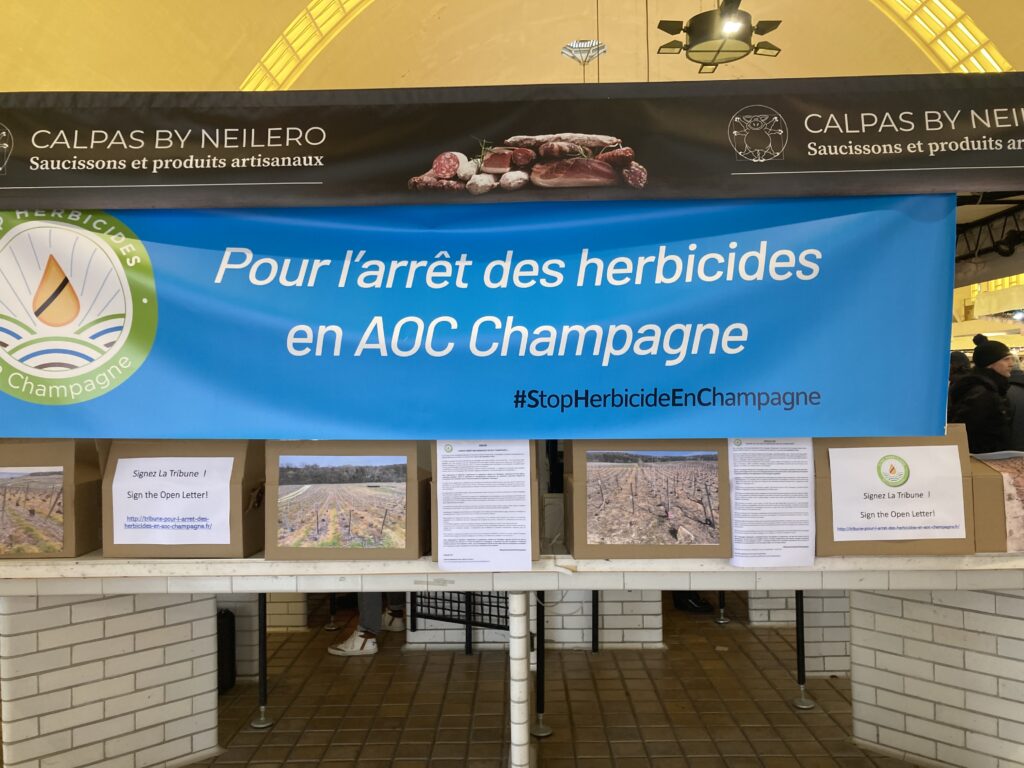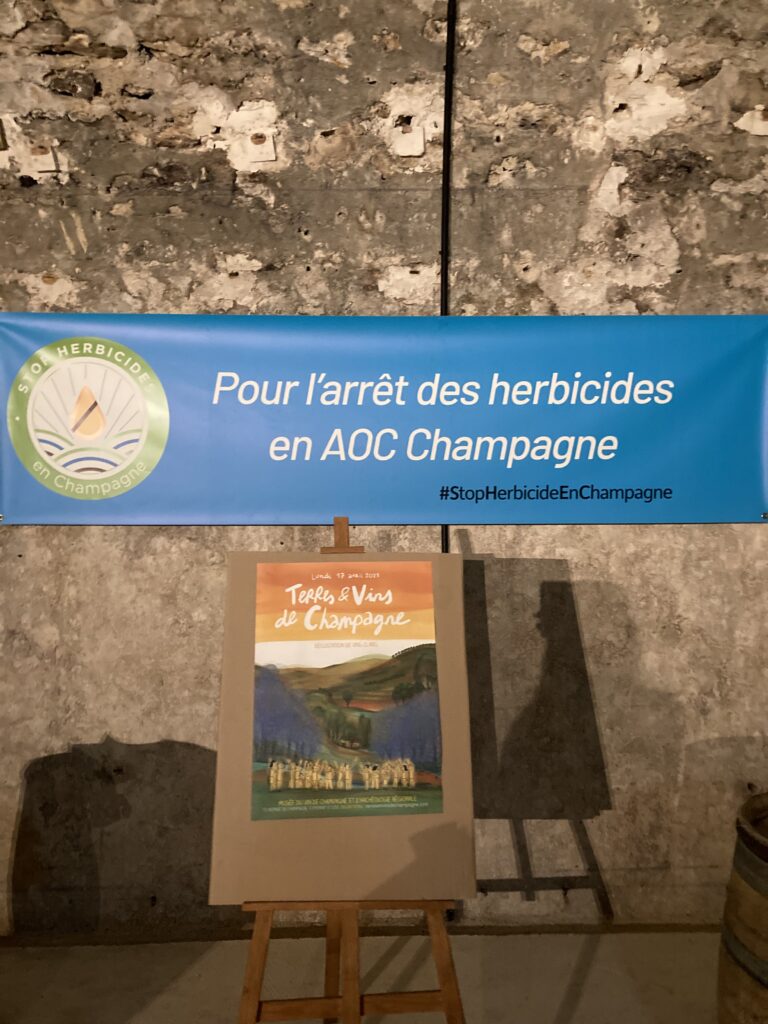On Sunday, 16 April, the Association des Champagne Biologiques named me their “Personality of 2023”. This Bulle Bio en Champagne prize is very special to me, because just as the Terres et Vins prize I received 5 years ago, one cannot apply, enter or pay to receive it. It is an acknowledgement by these groups of producers for one’s contribution to champagne. are only 2 people with both these prizes, and I am so very humbled to share this honour with the great Pascaline Lepeltier, who was the Bulles Bio en Champagne Personality of the Year in 2019 and who received the Terres et Vins prize this year.
This year, both Bulles Bio en Champagne en Terres et Vins en Champagne had as theme “Stop Herbicides in Champagne.” This is also the topic of my acceptance speech which you can read here below. If this topic is something you would like to support, please take a minute to read the open letter published by a group of Champenois winemakers protesting the U-turn on the zero herbicide promise made in 2018. And if you would like to see change happen, please also sign in support for this cause. Thank you very much!

2500 years ago, in ancient Greece, Heraclytus famously pondered the question of impermanence. He argued that the fundamental essence of the universe lies in its ever-present change. And even if many philosophers have since tried to rebut him, today it is well accepted that we need to change to evolve. However, this does not mean that we readily or easily accept change. In fact, our brains do not like the unknown, and our natural, pre-historic reaction is to avoid or fight it. It takes conviction, determination and courage to overcome our aversion to change, which is maybe why pioneers do not come by the dozens.
They are different, because they are driven by what can be rather than what is. Pioneers are generally branded as dreamers, disconnected from reality, and are often shunned or ridiculed or both. However, without these visionaries, we would still believe the earth was flat, we would never have heard and even less travelled to other continents, and be blissfully digitally unconnected. Moreover, champagne would not have been a blended wine, it would have no bubbles, and industrial agriculture with chemically boosted yields would have remained a pipe dream. And whether the change viewed in hindsight was positive or negative, for it to happen at all, a few people had to dream big and be courageous enough to create this new reality.
In Champagne, change has always been driven by the underdog, and general adoption has been a slow, drawn-out process. But whether we talk about riddling, decreasing the dosage or blank spraying of herbicides, all of these ‘innovations’ have eventually been embraced by everyone and have become the new ‘normal’.
Today, in Champagne, the ACB is this pioneering underdog because they actively search alternatives to whatever dysfunctions the status quo has brought up. Moreover, they readily share this information, not only with their members and supporters, but with anyone who is considering a more environmentally friendly way of farming.
The most recent daring example of the ACB’s visionary role can be seen in their relentless fight against Champagne’s U-turn on its announced (and very well mediatized) zero herbicide promise. The 0-herbicide announcement, when it was first made by Jean-M arie Barillère and Maxime Toubart was a bold movement for a region firmly anchored in excessive herbicide usage. However, it proved to be very little more than an empty promise made from fear of legal enforcement and without a real implementation plan. It is therefore not surprising that once the legal pressure waned, Toubart was quick to announce that no ban on herbicide usage would be enforced via the cahier des charges. It is a well-known fact that in love and politics, all is fair as long as it serves a purpose. For Toubart this is hanging on to the presidency of the SGV and the lime-light that comes with it. It was therefore obvious that he was never going to put up a fight to ban herbicides against his administrators who had been lobbying to keep using them. It took the bold move of publishing a signed open letter denouncing the U-turn on the herbicide ban for him even to acknowledge the topic again, but bar condemning the illegal practice of mass nuking the vineyards (“bad for champagne’s image’) in Thursday’s SGV’s AGM, he continues to avoid the topic and refuses to take action to reinstate the 0-hericide promise.

It is therefore paramount, to keep up the fight, by maintaining pressure on the SGV, UMC and the CIVC. For those of you, that like me are members of the press, use your voice to remind the powers that be in Champagne, that breaking a promise for no other reason than greed, is not acceptable, especially not if this stimulates soil erosion and will further pollute the waterways. It is important to point out here as well that the French government has banned the use of glyphosate and other herbicides in all public spaces and for private usage and that blank spraying, which remains a common practice in the Champagne vineyards, is forbidden by the law. In a region where grape prices are at an all-time high, and yields are significantly higher than in other regions, there is no possible justification for continuing to hang on to herbicide usage. Moreover, as herbicides destroy the microbial soil life, they also negatively impact the soil nutrients for the vines, which in return may hamper phenolic ripeness and acidity levels in the grapes. Herbicides are also known to negatively impact natural yeast fermentation capacity, hence creating a need for more additives in the winemaking process. It is therefore difficult to argue that they improve or even maintain wine quality. Lastly, residues are found in the wines (and in the drink water) hence ultimately in our bodies with possible cancerogenic risks for wine consumers as well as the local population. All of this defies champagnes’ self-proclaimed image of being a superior high quality sparkling wine, symbolic of celebrating life.
While the ACB will maintain pressure on the SGV to try and persuade it to once again change tack on this issue, it is very unlikely they will act voluntarily on this. Toubart is no Frederic De Klerk or Mikhail Gorbachev, he is far too attached to his personal power to give it up for a rightful reason. It is therefore primordial that all of us become educators on how many herbicides most champagnes contain, and what the impact of continuing this practice has on the water ways, local population and workers and maybe most importantly, the wine quality and the consumer’s health. It is only by spreading awareness on this dirty secret the wider champagne profession would prefer to hide, that change will eventually come about. When the herbicide abuse becomes an on-going scandal, the Houses and the UMC will prefer to rock the herbicide boat rather than sink with it. After all, the impossible quickly turns into possible when one’s back is against the wall. So even if today not much has changed, I am positive that with continuous pressure, herbicides will eventually be banned in champagne. Change may take time, but to requote Heraclytis, change is the only constant in life.
